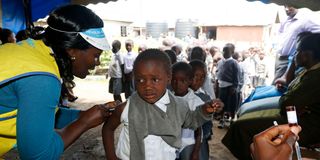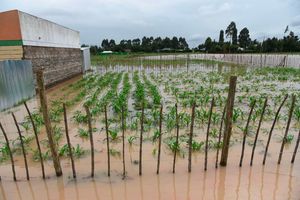Good news as Kenya records high levels of childhood immunisation

Pupils from Melon Mission School in Nakuru County receive a Measles-Rubella vaccine during a past campaign.
Kenya’s interventions have led to high childhood immunisation rates in the country, a new report has shown.
However, global rates are dropping, with the Covid-19 pandemic to blame.
The report by Unicef was released this week and it coincides with the World Immunisation Week that happens annually during the last week of April.
Some of the interventions that put Kenya on the global map include digital projects, house to house visits by community health workers and the use of short messaging service (SMS) to remind people that their children are due for immunisation.
“When parents received an SMS and a small monetary incentive, the number of fully immunised children grew significantly,” shows the report.
While Kenya may seem to have done well, the report shows that in the period between 2019 and 2021, about 67 million children globally either missed out completely or partially some of the routine immunisations available. “Disruptions caused by the pandemic interrupted childhood vaccination almost everywhere, setting back vaccination rates to levels not seen since 2008,” says the report.
This is why the theme for this year’s immunisation week is ‘The Big Catch-up’ and the World Health Organization says it aims at fast-tracking progress in countries to get back on track from the pandemic pitfall to ensure that children are prevented from diseases.
Dr Catherine Russell, Unicef’s executive director, lamented that despite decades of progress in childhood immunisation, it is unfortunate that collective efforts are falling short of the target.
“Put simply, we are not meeting our goal to vaccinate every child. While new vaccines have been introduced that broaden protection against disease, none have managed to reach more than nine out of 10 children. Many are not even coming close – only one in eight girls has received the human papillomavirus (HPV) vaccine, which protects against cervical cancer,” she said.
Dr Russell now says that the Covid-19 derailed the little progress that had been made regarding routine childhood immunisation.
“Getting back on track will be challenging. The shadow of the pandemic will hang over economies for years to come, forcing tough choices in spending and investment,” she said.
During the pandemic, there was a rise in anti-vaxxers campaigns that influenced people to overlook vaccines. Dr Russell now says that people’s confidence in childhood vaccines seems to be following that route.
“While vaccine confidence is far from being the most important determinant of vaccine demand in most communities, the apparent rise in hesitancy cannot be ignored,” she said.





